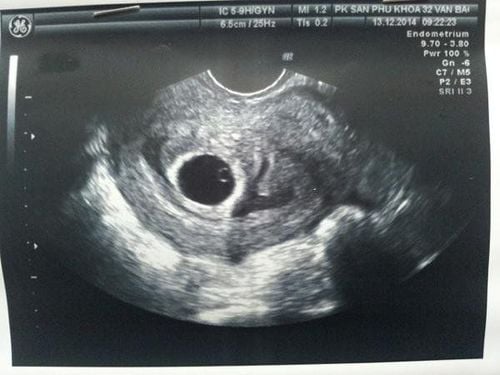This article was professionally consulted by Trần Hồng Nhật, MSc, MD - Cardiology Center - Vinmec Central Park International General Hospital.
Rapid heartbeat during pregnancy is a common occurrence for most expectant mothers, causing understandable concern. So, what causes this phenomenon, is it dangerous, and what are the solutions? Let's join Dr. Master Trần Hồng Nhật, Cardiology Center of Vinmec Central Park International General Hospital, to explore this topic in the following article.
1. Increased Heart Rate in Pregnant Women
A healthy woman has an average heart rate of about 70 beats per minute. However, during pregnancy, a woman's heart rate gradually increases starting from the 10th week of gestation and can range from 80 to 90 beats per minute.
In the late stages of pregnancy, the heart may beat faster by about 10 beats per minute compared to before, and the amount of blood the heart must pump each day to nourish both the mother's body and the fetus also increases.
When the fetus is 25 weeks old, the amount of blood passing through the mother's heart can increase by 30-50%, which is equivalent to the heart having to "work overtime" each day to supply an additional 2160-3600 liters of blood or about 2-4 tons of blood.
Trắc nghiệm: Bạn có hiểu đúng về dấu hiệu mang thai sớm?
Các dấu hiệu mang thai sớm không phải chỉ mỗi trễ kinh mà còn có rất nhiều dấu hiệu khác như xuất huyết âm đạo, ngực căng tức,… Điểm xem bạn biết được bao nhiêu dấu hiệu mang thai sớm thông qua bài trắc nghiệm này nhé!
2. Why does the heart beat faster during pregnancy?
A pregnant woman's heart works harder because, in addition to nourishing herself, her body must also supply more oxygen and nutrients to nourish the fetus. This causes the mother's heart to work harder to serve both mother and child.
Furthermore, anemia is another cause of a faster heartbeat during pregnancy. During pregnancy, the mother's body often experiences anemia due to iron deficiency and increased oxygen demand. 1 Anemia can cause the mother to feel short of breath, have a rapid heartbeat, feel tired, and dizzy. Pregnant women should bring this to their doctor's attention because if left untreated, anemia can become more severe and affect the mother's health and the fetus's development. Discomfort is a common companion throughout the 38-42 weeks of pregnancy. A rapid heartbeat and shortness of breath are just a few examples, and very few women can avoid them.

3. Is it normal for pregnant women to experience shortness of breath and a rapid heartbeat?
For women in good health, symptoms like a rapid heartbeat and shortness of breath during pregnancy are completely normal. These changes are a natural part of pregnancy. Pregnant women shouldn't worry excessively but should consider
them a normal part of pregnancy and actively communicate with their doctor to manage any potential issues. Additionally, most of these discomforts will gradually disappear and return to normal after childbirth. While this is generally the case for women with pre-existing heart conditions or poor heart function, changes in heart rate during this time can become dangerous, increasing the likelihood of heart failure or arrhythmia. Pregnant women should inform their doctor immediately if they notice any worsening symptoms, such as:
- A sudden and noticeable increase in heart rate, irregular heartbeat, unexplained palpitations, or a racing heart.
- Severe shortness of breath, cyanosis, or feeling increasingly weak after experiencing a rapid heartbeat.
- Chest pain, especially when exerting oneself.Shortness of breath even when resting, lying down, or difficulty breathing at night.

4. How to alleviate rapid heartbeat during pregnancy
To minimize the risk of arrhythmia and worsening shortness of breath, pregnant women should rest and avoid overexertion. Even climbing stairs should be done slowly. If you feel tired, experience a rapid heartbeat, or have difficulty breathing while doing any activity, you should stop and rest. As you approach the middle and end of your pregnancy, it's crucial to rest, limit activities, and avoid strenuous exercise. This will help protect your heart and lungs and reduce the occurrence of rapid heartbeat and shortness of breath. If your pregnancy symptoms become unusually severe, you should be taken to the hospital immediately. It's important to emphasize that shortness of breath and rapid heartbeat are common during pregnancy and are not necessarily a medical condition. These are simply physiological changes that occur during pregnancy. Pregnant women should not stress or worry. Instead, they should maintain a positive outlook, pay attention to their lifestyle habits, and communicate more with their partners about their challenges. This way, their partners can provide the best support. Additionally, remember to attend regular prenatal check-ups as your doctor advises.
Through this information, Vinmec hopes that pregnant women better understand rapid heartbeat during pregnancy and how to manage it.
Please dial HOTLINE for more information or register for an appointment HERE. Download MyVinmec app to make appointments faster and to manage your bookings easily.















